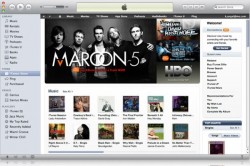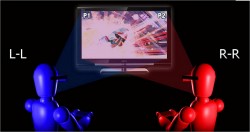Weekly News Roundup (12 June 2011)
Quality over quantity, is something I firmly believe in. Which brings up to this week’s WNR, which is pretty light in terms of quantity of news items, but high in terms of quality of the mindless ranting that I can produce from these discussion worthy stories. So let’s not waste precious words on the intro, and get started with the roundup/rant, because this WNR is a fairly long one.
 Starting with copyright news, there’s one story that I really want to talk about, you know, the one that may just change the face of the music business, but for now, let’s quickly get through the other stuff.
Starting with copyright news, there’s one story that I really want to talk about, you know, the one that may just change the face of the music business, but for now, let’s quickly get through the other stuff.
You know it’s bad when the UN has to write a report just to call you jerks, but that’s exactly the kind of face slap France and the UK faced this week, when an UN report found that three-strikes anti-piracy legislation is a human rights violation. UN Special Rapporteur Frank La Rue found that cutting off people’s Internet connections, for piracy or any other reason, is tantamount to violating their rights of expression, because governments should not have the right to limit a specific kind of communication. The UN believes that nobody should be banned from using a communication medium, especially by the government, and certainly not for something as trivial such allegations (and they’re only allegations) of copyright infringement. While the Internet is very different, the principle is the same, in that the government should not be able to ban you from using the telephone, reading books and newspapers, listening to the radio or sending letters, as these would all be rights violations (note that whether you can afford to use any of these services, that’s a totally different matter – the point is that if you had the resources to do so, you should be able to do so, without the government interfering). The report made special mention of France’s three-strike laws, and the UK’s Digital Economy Act, so looks like France and the UK will join the list of human rights violators unless they change tract. It’s also a warning to any other country thinking of doing the same (I’m looking at you, Australia).
And it’s not just the UN that is attacking the bias in copyright legislation and legal actions, the legal establishment is taking action as well. The UK Solicitors Regulation Authority (SRA) has handed down its ruling against two former employees of Davenport Lyons who are considered pioneers of the mass copyright lawsuit schemes – and it’s guilty, on all six counts, of professional misconduct. David Gore and Brian Miller came up with the clever idea to extract pre-trial settlement fees by threatening suspected copyright infringers with massive penalties. But following many complaints, from any that said they were completely innocent, the SRA stepped in and a thorough investigation found the pair guilty of a lot of things. If targeting people based on flimsy evidence wasn’t enough (the SRA felt that IP address alone isn’t sufficient, in terms of proving copyright infringement – an important ruling), then targeting knowingly innocent people was a step too far. The pair could now face disbarment. The SRA’s decision is welcomed, but really, everyone knows that, at best, these types of practices are nothing but legal blackmail. Law firms should not be able to ask for pre-trial settlement fees if they have no intention to go to trial, period.
And also bad news for the US Copyright Group in their massive ‘The Expendables’ lawsuit, which now consists of 23,000 named and unnamed defendants. The judge in the case, having earlier allowed the USCG to issue subpoenas to get more information about the defendants, is reconsidering, and is beginning to see the whole thing as “inappropriate and a waste of scarce judicial resources”. And that’s the sensible conclusion that all judges should come to, when it’s plain as daylight that firms like the USCG are out to make money, with almost zero intentions of actually going court. Please refer to the last sentence of the previous paragraph.

iTunes Match will either make buying music obsolete, or it will do absolutely nothing, depending on who you talk to
And of course, we come to the main course. Steve Jobs’ “one more thing” at the Apple Developer Conference has the whole Internet both excited and confused, with some really angry as well. The whole iCloud thing is fairly standard, but iTunes Match promises to be something else, or nothing at all, depending on who you believe. The problem is that we just don’t have enough information, but based on what we’ve heard so far, anyone could be right. So what is iTunes Match? Well, basically, it’s an addition to iTunes and iCloud that scans your hard-drive for songs, and regardless of whether these were purchased from iTunes, or elsewhere, or even pirated, iTunes Match will try to match the song to one of the 18 million songs in iTunes, and then from that point onwards, you will be able to download the 256 Kbps iTunes legal version of the same song for free on all your iDevices (and if the song doesn’t exist, you can upload your local copy to iCloud). That’s right, even if you have some crappy 128 Kbps MP3 of a song you copied from a friend who downloaded from LimeWire, you’ll now get a clean, high quality (relatively speaking) version of the song from iTunes. After you pay the $25 per year fee, of course. And best of all, all the major labels, all four of them, seems to be fully supportive of Apple’s plans (no doubt because they get 70% of the $25 annual fee).
As so the Internet nearly exploded, with some calling this a piracy amnesty, the term “music laundering” was mentioned, while others feel that it’s $25 to access music you already had, which is totally pointless. The truth is probably somewhere amongst the mix.
Before we get to the pros and cons, let’s just go through how iTunes Match will work, or at least how I think it will work based on the current information. So you start iTunes Match, and it scans the songs on your hard-drive. Now, I doubt it will be as simple as an ID3 tag match, because ID3 tags are not exactly accurate. What I think will happen is an actual audio match, like how the SoundHound app works, which I think should be the most accurate way of matching tracks. And if the song does exist on iTunes, the song is “uploaded” to your iCloud account (and it does not count as quota either), or rather, Apple simply allows you permission to download the song using your iCloud account, and you now get to download (not stream) the same song on all your iDevices, as if you had manually uploaded the 256 Kbps iTunes downloaded AAC to your iCloud account.
So now you know how it works, let’s get some of the misconceptions out of the way. Some are saying this is a Trojan Horse, that by scanning your files, Apple will send all the info to the RIAA so they can sue the crap out of you. This is not going to happen, simply because there does not yet exist a tool that can accurately tell the difference between a DRM-free legal track, a track you ripped from your legally purchased CD, and one that you downloaded from the Internet illegally. First of all, the illegally downloaded track may very well be a DRM-free track that somebody else uploaded, minus some tracking tags perhaps. Or it could be just a CD rip that someone had uploaded, and there’s no way to tell if it’s your CD rip, or someone else’s. Another popular one is that iTunes Match will delete all the matched songs from your hard-drive, thus destroying your precious pirated music collection. Ridiculous really, because what’s to stop you making a backup of the songs before you “iTunes match” it? And why would Apple bother when, immediately after deleting all your shoddy pirated MP3s, they immediately give you pristine HQ AAC copies to download, copies that are also DRM free. As for making your iTunes Match downloaded AACs stop working once you stop paying the $25, not going to happen either, because the tracks are DRM free, and because they’re downloads, not streaming, you can keep downloaded copies forever, on multiple devices, after you stop paying the $25.
So it iTunes Match really a godsend for pirated music collectors, does iTunes Match really give you the iTunes download version of songs even if your original was a pirated track? Yes it does, absolutely. And is this a piracy amnesty or music laundering? It depends.
It depends on information that’s just not available yet, and the differences are very subtle between the “Yes” answer, and the “No” answer, and it’s more of a legal and moral position, than anything else. What do I mean? Well, let’s take someone who decides that iTunes Match is a piracy amnesty, music laundering service, so they go and download 300 pirated songs every month. First of all, the act of downloading pirated songs is still illegal, and iTunes Match doesn’t even come into play here, so you may still get caught and get fined. But let’s assume you’ve found a way to download without being detected, okay, you run iTunes Match on those 300 songs, and voila, record label approved iTunes downloads on your iPod.

Buying a song from iTunes and downloading a copy from iTunes Match may be two very different transactions, with different legal rights
This is where it gets tricky. See, if the iTunes Match downloads come with the same license as a regular purchased iTunes song, then yes, you’ve just turned pirated songs without licenses into iTunes downloads with licenses, and laundering is complete. However, if iTunes Match merely provide a license to download the matched song, with no proof of purchase included, then no laundering has been done. You still don’t have a proof of purchase for your pirated songs, and you never will. Not that anyone really cares about proof of purchase or anything.
As for the argument that iTunes Match helps people to pirate songs, well, that doesn’t really hold true either, as people need to have pirated before they use iTunes Match. Similarly for the argument that iTunes Match allows people to enjoy more songs than what could otherwise be had for $25, iTunes Match can only allow you to download copies of songs you already have, and if you already have those songs (pirated or legal), then you could already enjoy those songs, so iTunes Match doesn’t really “add” to the enjoyment in any way.
And as for whether iTunes Match will encourage people to buy less, it depends on why people buy songs the first place. Those morally bound to buy them will still do so, same as those who buy music to support the artists (but you’d be better off going to see their concert, as they get more of your money that way). And basically, anyone already buying legal music probably won’t be swayed either way by iTunes Match.
For those that do pirate a lot, iTunes Match may make you feel a little bit better about your activities, with no real legal protection (if, as I assume, you don’t get a license/proof of purchase with your iTunes Matched downloads), and the convenience of having everything done through iTunes (if you think that is a convenience), and all for the low low price of $25 per year. That’s (70% of) $25 more than what the record labels would have gotten before, so for them, it’s a bonus. The only real problem could be that, because of existing artist licensing deals, they may miss out on any share of the $25, so if you want to support the artists, this is not the worst way to do so.
So there you have it, Apple iTunes Match explained. Clear as mud.

In HD and 3D news, nothing much again, but NPD has a new research paper out that says Blu-ray penetration, after the first five years of the format, has reached 15%. If this sounds a little bit underwhelming, perhaps it is, because DVDs at the same point had a much higher penetration level.
But Blu-ray is not DVD, and Blu-ray has to work a lot harder for every percent, since it’s a much more subtle upgrade to DVD than DVD was for VHS. It’s like going from horse cart to a car, and then going from a 1990’s car to a brand new model. What I found interesting in the report was that half of the people wanting to buy a Blu-ray player in the next six month wanted one because it could deliver digital content, because all Blu-ray players can do it now. So in a way, Blu-ray is helping optical disc formats stay relevant in the Internet age, and at the same time, it’s helping its own demise by helping to improve the penetration of digital delivery hardware. It’s very much a bridging format, between the optical and digital, but just because there’s a bridge, it doesn’t mean everyone will cross over it, and I still firmly support disc formats because, call me old fashioned, I still like to have something to hold in my hand and also something to display on non-virtual bookshelves.
![]()
This is a big week for gaming, thanks to E3, but as this is not really a gaming website/blog, I’m going to skip most of E3’s announcement, because I just don’t feel like making a big deal out of the next Batman game or whatever.
But that doesn’t mean there aren’t some announcements that are too big to ignore. Of course, the big one being the announcement by Nintendo of their new console, but I shall ignore this for a moment while I talk about the other game company’s announcements.
Microsoft’s E3 was all about Kinect, and they showed demos of the Star Wars Kinect game, which looks more like an on-rails game, which is kind of disappointing, but probably not unexpected. Microsoft surprised us last year with the Xbox 360 “Slim”, but this year’s “surprise” was less significant, something about Live TV that’s not going to make its way to Australia (although YouTube integration should be helpful, but it’s hardly unique). Microsoft did unveil Kinect Labs, which is like an app market for Kinect, and it now includes a few free “gadgets”, including one that tries to make a life-like avatar, or one that turns inanimate objects into something that comes alive on the screen (it’s not as good as it sounds). With the Kinect SDK coming soon, launching Kinect Labs is a solid step. As for full Kinect games, Microsoft promises more on the way, including Mass Effect 3, which will allow you to speak the lines of Commander Sheppard as a way to choose dialogue options (of course, you could just select and click – and since the character itself always elaborates on the chosen dialogue, speaking out the choice may feel a bit strange, like saying everything twice). As for why Kinect is needed for simple voice recognition, when a headset is all that’s required, BioWare says it’s all to do with the Kinect system, where developers don’t need to do much when it comes to doing voice recognition as it’s all handled by the Kinect hardware/software combo. Microsoft even promised that all first party games will come with some Kinect interaction, which is something that I felt was the right thing to do back when Microsoft were saying they would only make games that could be played entirely with Kinect and nothing else. With EA announcing FIFA will support Kinect, I’m looking forward to taking and saving penalties by kicking and diving around the living room.

PlayStation TV can let two players play on the same screen without a split screen, using special glasses based on 3D technology
For Sony, other than apologising to everyone over and over again, E3 was about the Next Generation Portable, now called PlayStation Vita (vita means “life” in Latin and Italian, of course). Sony have already announced a lot about NGP/Vita, so there were no big surprises. What I found interesting was the PS3 branded TV. What was interesting is that it allows two players to play on the same TV *without* a split screen, and that’s totally possible using the 3D TV in a 2D way. 3D works by displaying two images at the same time (well, not really, but that’s what our eyes perceive when looking at the picture without the glasses), with the glasses separating the image into ones for the left and right eyes. The same principle can be used to display two images, one for player one, and one for player 2, and if the glasses instead of separating the image for each eye, simply separated the image for different players, then you have two player gaming without split screen. Of course, without glasses, it will look like a right mess. Theoretically, with the right glasses, almost any 3D TV can be made to do the same. Whether it’s better to wear glasses and have a full screen picture, or to not wear glasses and have a split screen, that’s an entirely different debate.
You can read more about the Microsoft and Sony announcements in this news post.
And then there’s Nintendo’s announcement. The Wii U will be the Wii’s formal successor. I’m not going to get into the debate about the name, because everyone though the Wii was stupid, and it is, but it didn’t really matter. What does matter is the humongous thing that Nintendo calls a controller, and it’s certainly been a point of debate. By having a 6.2″ touch-screen on a controller, and with the controller’s screen able to interact with the main screen, or even operate independently, it does add to the versatility. For example, you can play simple board games on the controller without even turning on the TV, or use the controller to display additional gaming information à la the dual DS screens, and with Nintendo promising minimal lag between the main screen and the controller screen, it can even be used as part of the game, for example using the controller’s screen as a binocular to zoom in on the action, where the main screen still stays the same (making sniper game play a bit easier).
But as Nintendo later conceded, perhaps too much was made of the controller itself, and not enough on the console. The Wii U console will be more powerful than the Xbox 360 and PS3, considering it is using hardware that’s years newer than what’s in those other consoles, and so with the gaming line-up, it seems Nintendo is firmly moving back into the ‘hardcore’ gaming sector, after straying perhaps a bit too far with the original Wii. That should help Nintendo, because the Wii U is still very “family friendly”, and even if you don’t like the new controller, all old Wii accessories will still be supported, as well as full backwards compatibility for Wii games.
And this could also be perhaps Nintendo’s biggest problem. The Wii was simple, clearly focused at one sector of gamers, but the Wii U tries to do much more, and it is this versatility and ambition that could ultimate sink it as a console. Everyone can imagine what you can do with a Wii-mote, and it was perfectly demonstrated by just one play of Wii Sports, but it’s much harder to imagine what you could do with the Wii U controller. Plus, with Nintendo intent on making the Wii U a hardcore gamer’s console too, as well as a console for the smartphone/tablet gaming generation, and maybe even taking on the portable consoles market that’s already dominated by their own DS, it may be trying to do too much with the same console. Or it could work out great, who knows.
Alright, that’s more than enough writing for this week, I just hope it’s not a long and laborious read. Well, not more than usual anyway. See you next week.


